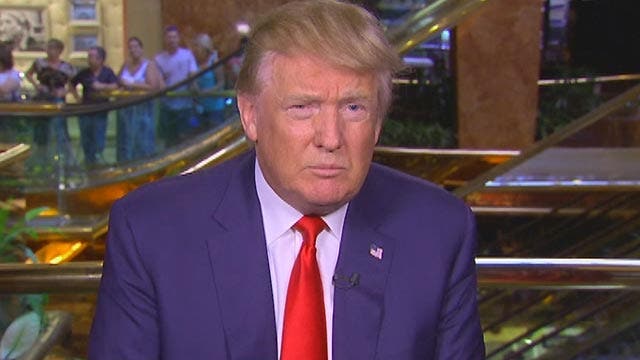Donald Trump lays out foreign and domestic strategies
GOP frontrunner on the migrant crisis, gay marriage debate, Iran nuke deal, and Black Lives Matter
KIEV, Ukraine – Attempting to burnish his foreign policy credentials, Donald Trump has agreed to deliver what is being touted as a major speech Friday about what the battle for Ukraine means for Russia and the West.
Organizers of the 12th annual Yalta European Strategy conference in Kiev said that Trump had agreed late this week to give his speech by satellite to this influential gathering of pro-Western diplomats, officials and academics who have met here in Kiev rather than in Yalta since Russia’s annexation of Crimea in the spring of 2014.
There appeared to be some last-minute confusion. Reached for comment, a representative with the Trump campaign said they were not aware of the address.
Trump has been widely criticized by his GOP rivals and Democrats alike for his lack of national security and foreign policy experience. Trump revealed gaps in his knowledge of foreign affairs in a recent interview with conservative radio host Hugh Hewitt when he confused the Kurdish people with the Iranian Revolutionary Guard’s overseas force and appeared unfamiliar with the names and leaders of Islamist extremist groups that the U.S. has been battling in its war on terror.
On the defensive, Trump responded by calling Hewitt a “third rate radio announcer” who had asked him “gotcha” questions. Hewitt will be one of the journalists questioning him and other GOP contenders in the debate being hosted by CNN later this month.
When Hewitt asked Trump whether he was familiar with the leaders of Hamas, Hezbollah and the Islamic State, Trump replied that he was unconcerned by the leaders of these militant Islamic groups, claiming that many would not remain in power by the time he was elected president, and that he would recruit experts to advise him in office. “I’ll have, I’m a delegator,” he said.
Trump also appeared unable to distinguish between the anti-Israeli militant Palestinian group in Gaza, Hamas, which the U.S. has designated as a terrorist group, and Hezbollah, the Shiite group that effectively controls much of Lebanon and parts of Syria. Asked when he would learn the difference, Trump replied “when it’s appropriate.”
“I will know more about it than you know,” Trump said. “And believe me, it won’t take me long.’
The conference in Kiev, known colloquially as a kind of "Davos East," a reference to the influential annual gathering of comparable officials and diplomats in Switzerland, has more participants this year than ever before, but relatively few high-level Americans. Two years ago when the meeting was held in Yalta, the conference’s featured speakers included Bill and Hillary Clinton, as well as former CIA director David Petraeus, who is participating again this year. Hillary Clinton, her party’s front-runner for the presidential nomination, will not be participating. She had already resigned as Obama's secretary of state two years ago when she spoke here of America's strong support for Ukraine. At this Friday’s evening’s session, Bill Clinton is scheduled to send a message of support via satellite.
Trump’s speech is expected to lambast not only Russia’s seizure of Crimea and its support for pro-Russian Ukrainian separatists who have been battling Ukrainian forces in the eastern part of the country, but also President Obama’s handling of the crisis.
The Obama White House has not led an effort to confront Russia over its land grab in Crimea. While it has provided millions in "non-lethal" assistance to Ukraine, much of its aid is in the form of loan guarantees.
A new report by the United Nations human rights monitors in Ukraine says that nearly 8,000 people have died and 17,811 have been wounded in the conflict which erupted in April, 2014 and has recently tapered off in the eastern part of the country. The report blames the continuing influx of fighters and weapons from Russia as the main obstacle to peace. The U.N. said there were daily violations of the cease-fire agreement negotiated in February in Minsk, Belarus, between Ukrainian government forces and the pro-Russian separatists who control large parts of eastern Ukraine.
Trump’s participation in this foreign policy star-studded gathering was a last-minute addition to a program which features, among others, former British prime minister Tony Blair, former Israeli president Shimon Peres, and several former European prime ministers and presidents. Sponsored by one of Ukraine’s wealthiest businessmen and philanthropists, Victor Pinchuk, the gathering is pro-Western but non-partisan.
In an interview, Pinchuk said that he had invited Trump to participate because the builder and reality TV star is currently leading the GOP field of candidates. A new poll shows Trump with over 30 percent of those polled for the first time. Pinchuk said that he also wanted to ensure that the gathering would hear from prominent Republicans and Democrats. Finally, he said, Trump has already made several recent statements about Russia and Ukraine that he hoped he would clarify and expand on. While Trump has been consistently critical of Russian aggression in Eastern Europe, Syria and other countries, he has also suggested that the challenge posed by Russia’s annexation of Crimea is a problem best handled by Europeans.













































